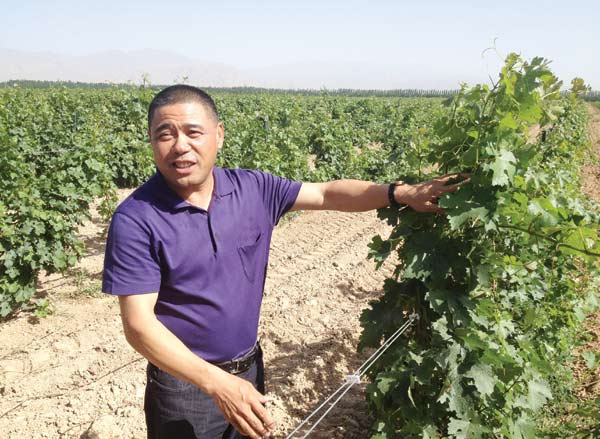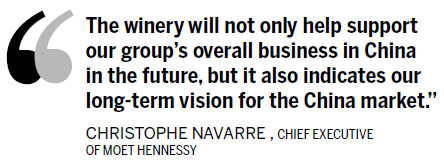

|
 Chen Deqi says Daysun group will invest 1 billion yuan to build new chateaus and a new vineyard in Yinchuan in six years. [Photo / China Daily]
|

Yinchuan city is making the most of an ideal climate to attract major money
Yinchuan, capital of Ningxia Hui autonomous region, might soon be known as the sparkling wine capital of China.
With the Chinese wine market booming, Yinchuan has attracted considerable investment in its winemaking center at the foot of Helan Mountain. French company Moet Hennessy even says it will have a locally produced premium sparkling wine on Chinese shelves some time next year.
With its strong sunshine, low rainfall and huge day-night temperature differences, this area in the northwest of the country is already among China's major wine production bases, which include Yantai and Changli. The Yinchuan vineyards have alluvial soil, which has been washed down from the mountains to the foothills and plains. It consists of sand, schist and small pebbles.
The Yellow River runs through the area and there are also many lakes, so there are no problems with water supply and irrigation.
Ningxia Daylong Winery Co Ltd, a subsidiary of Thailand's Daysun Group based in Bangkok, has increased its investment in Ningxia as part of a strategy to expand its presence in China.
Daylong Winery currently has a grape-planting base of 6,670 hectares with all the grafted seedlings coming from France and Italy. To ensure quality, the planting is limited to 3,300 plants a hectare, the maximum output is set at about 7,500 kilograms a hectare.
Since founding its first winery in Yinchuan in 2008, the Thai company has invested 600 million yuan ($98 million) to develop its wine business in the region.
"We will invest 1 billion yuan in our winery over the next six years," says Chen Deqi, president of Daysun Group and a Thailand-born Chinese. "The money will be spent on adding more breeding parks for improving seed, logistics facilities, machinery, a shelter forest belt, new chateaus and a new vineyard covering 6,600 hectares."
Daylong's cellar, which is 5 meters underground and covers 5,200 square meters, holds more than 700 oak barrels imported from France. These barrels cost between 9,000 and 20,000 yuan each.
Guided by seven French winemakers, the grapes are crushed, fermented, bottled and stored before going on sale. It takes 10 to 18 months of storage in a cellar for the bitterness to go out of the wine.
Chen, 57, says the quality of wine depends largely on the quality of the grapes. Helan Mountain stands at a latitude of about 38 degrees north, similar to Bordeaux in France. Its advantageous natural conditions add to the competitiveness of its local wine industry.
The company employs 860 people at its vineyards and exports its wine to Poland, Ukraine and South Korea.
To further develop the wine-making industry, the Yinchuan government plans to develop 10 high-quality cellars in the area. This year it also plans to build a large experimental zone as well as an international wine museum, according to supporting policies.
The grape-planting area stands at 34,000 hectares across the region. A total of 77 winemaking businesses have been established in the city, with production capacity reaching about 179,000 tons. Most of them have developed key components in the industry's supply chain, including fermenting, storage and bottling.
An additional 4,000 hectares of vineyards will be planted in Yinchuan this year, according to the Ningxia Forestry Bureau.